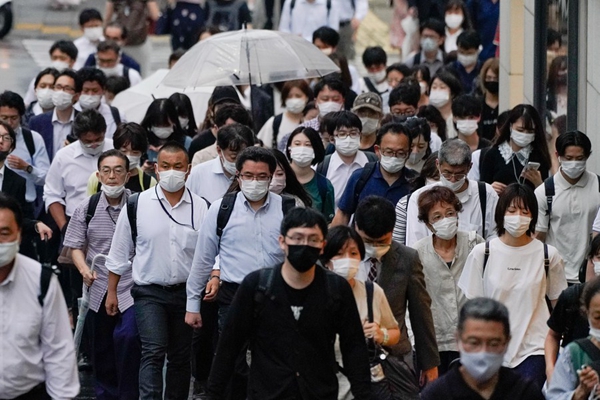Japan to expand, extend COVID-19 state of emergency
 0 Comment(s)
0 Comment(s) Print
Print E-mail Xinhua, August 18, 2021
E-mail Xinhua, August 18, 2021

The Japanese government decided on Tuesday to extend the COVID-19 state of emergency covering Tokyo and other areas to Sept. 12, while expanding the measure to seven more prefectures.
The decision was made amid a resurgence of infections that shows no signs of subsiding.
Ibaraki, Tochigi, Gunma, Shizuoka, Kyoto, Hyogo, and Fukuoka are already under a quasi-state of emergency, which is less restrictive on business activity, but will upgrade their measures from Friday.
Japanese Prime Minister Yoshihide Suga declared the decision after making it official at a task force meeting, warning that Japan is seeing an "unprecedented" rise in COVID-19 infections and saying that the government's "top priority" is to provide life-saving medical care to the public.
He will explain the decision at a press conference later Tuesday.
The extension means Tokyo will host the Paralympics, which is scheduled from Aug. 24 to Sept. 5, entirely under the state of emergency. Organizers agreed the previous day to hold the games, much like the just-ended Olympics, with most of the venues free from any spectators.
The COVID-19 emergency will cover a total of 13 prefectures, while additional 10 prefectures enter a quasi-state of emergency, which will also be effective from Friday through Sept. 12.
Yasutoshi Nishimura, the minister in charge of Japan's coronavirus response, said that hospitals are in an "extremely severe situation" especially those nearby Tokyo, and new measures are needed to ensure the provision of medical care to people.
Tokyo confirmed 4,377 new COVID-19 infections on Tuesday, and patients in serious condition in the capital increased by eight from the previous day to 276, according to the metropolitan government.
The number of COVID-19 patients with serious symptoms, including people in intensive care and those on respirators or life support, increased to 1,646 as of Monday, logging a record high for the fifth consecutive day, the health ministry said.
The current state of emergency, the fourth one in Japan which originally ends on Aug. 31, has already been extended once before for Tokyo and was earlier expanded to prefectures including Kanagawa, Chiba, Saitama, and Osaka. In addition, the Okinawa prefecture has been under the measure since late May.
Under the state of emergency, establishments serving alcohol or offering karaoke are asked to suspend their businesses during the period, and those not serving liquor are requested to close at 8 p.m. local time.
Commercial facilities that equal or exceed 1,000 square meters of floor space will be asked to limit the number of customers allowed in at the same time, said Nishimura.
A total of 16 prefectures will be under the quasi-state of emergency, requiring establishments in some areas designated by governors to cut opening hours and suspend serving alcohol.
The 10 newly added prefectures are Miyagi, Yamanashi, Toyama, Gifu, Mie, Okayama, Hiroshima, Kagawa, Ehime, and Kagoshima. The six areas already under the measure are Hokkaido, Fukushima, Ishikawa, Aichi, Shiga, and Kumamoto.






Go to Forum >>0 Comment(s)